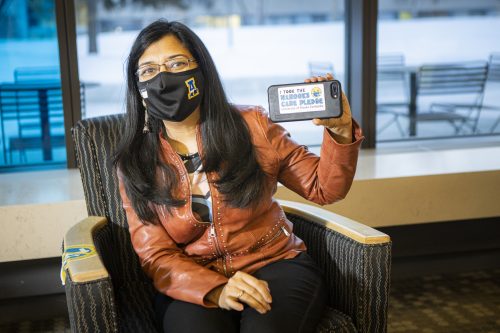Friday Focus: Mask yourself — just don’t mask your emotions
February 11, 2021

— by Anupma Prakash, provost and executive vice chancellor
We are creatures of habits and follow patterns we set for ourselves. Since I moved to Fairbanks in 2002, every December I either travel back to India to spend time with my family or visit Germany to meet Rudi’s (my husband’s) parents. This is my annual respite, a time to reconnect, be pampered, absorb some sunshine, recharge and be ready for the next year.
This December the world held still, and so did I. The break was very different. Instead of laughing and sharing stories with my friends, I spent many hours at home under the blanket, binge-watching Netflix, and procrastinating doing things that I had mentally planned to do.
On the surface, that break felt restful but deep inside it felt hollow. My mind knew that I had broken a familiar pattern, and I wanted it to believe that everything was fine. The mind was not ready to accept that bluff and it wasn’t communicating well with my body. Both the mind and the body were signaling me to watch out for my well-being. Not just my physical well-being, but my mental, emotional and psychological well-being.
The COVID-19 pandemic has dragged on for nearly a year and it has impacted everyone. Just this week, the National Academies released a report on Mental Health, Substance Use, and Wellbeing in Higher Education: Supporting the Whole Student. The report notes that “even before the pandemic, rates of mental health problems were on the rise. Eighteen percent of students reported experiencing major depression in 2018-2019, compared to 8 percent in 2007. And 14 percent reported thinking about suicide in 2018, up from 6 percent in 2007. Graduate students report depression and anxiety at rates 6 times higher than that of the general population.”
The ongoing pandemic has just exacerbated the already scary statistics. Another recent study found that 58 percent of college students surveyed said they were “moderately,” “very” or “extremely” worried about their own mental health.
I find myself thinking and talking about mental well-being with more candor than I have ever done before. In a twisted way, the pandemic has destigmatized issues surrounding mental and emotional well-being. We need to build on this momentum and promote honest and open conversations about mental health. That is only possible if we embrace a culture of vulnerability. The stories we tell ourselves and that we tell each other need to change.
One big challenge with mental health is that someone who needs help may not look different from someone who does not need help. Trained professionals can detect early symptoms and provide meaningful interventions to prevent or address mental health issues. UAF’s Student Health and Counseling Center has trained professional staff who are there to help our students who are facing mental health issues. UAF has excellent faculty with expertise in counseling and in trauma-informed pedagogy who are putting together trainings so that as a campus community, we are more aware of mental health issues and can better support each other.
It is time to recognize and acknowledge that we all need help at times and we all can help at other times. We are in this struggle together. It is OK to reach out for help. Sometimes just reaching out and talking to someone else helps. If you can listen to someone’s concerns and lighten their burden, you’ve already made a deeply meaningful contribution. However, if you are struggling yourself, and feel like you don’t have the emotional bandwidth at that time to listen, it is also OK to set a boundary and politely say no to any intrusive demand for attention. To build a healthy and caring campus community, we need to watch out for ourselves as much as we need to watch out for others.
This pandemic has taught us a lot. We will come out of it as a more resilient community. As the vaccines are rolling out, there is a growing sense of cautious optimism. There are still many unanswered questions, and it is important to remember that this is not the time to let down our guard. To keep the campus safe, please continue to mask yourself — just don’t mask your emotions.
Friday Focus is a column written by a different member of UAF’s leadership team every week. On occasion, a guest writer is invited to contribute a column.


